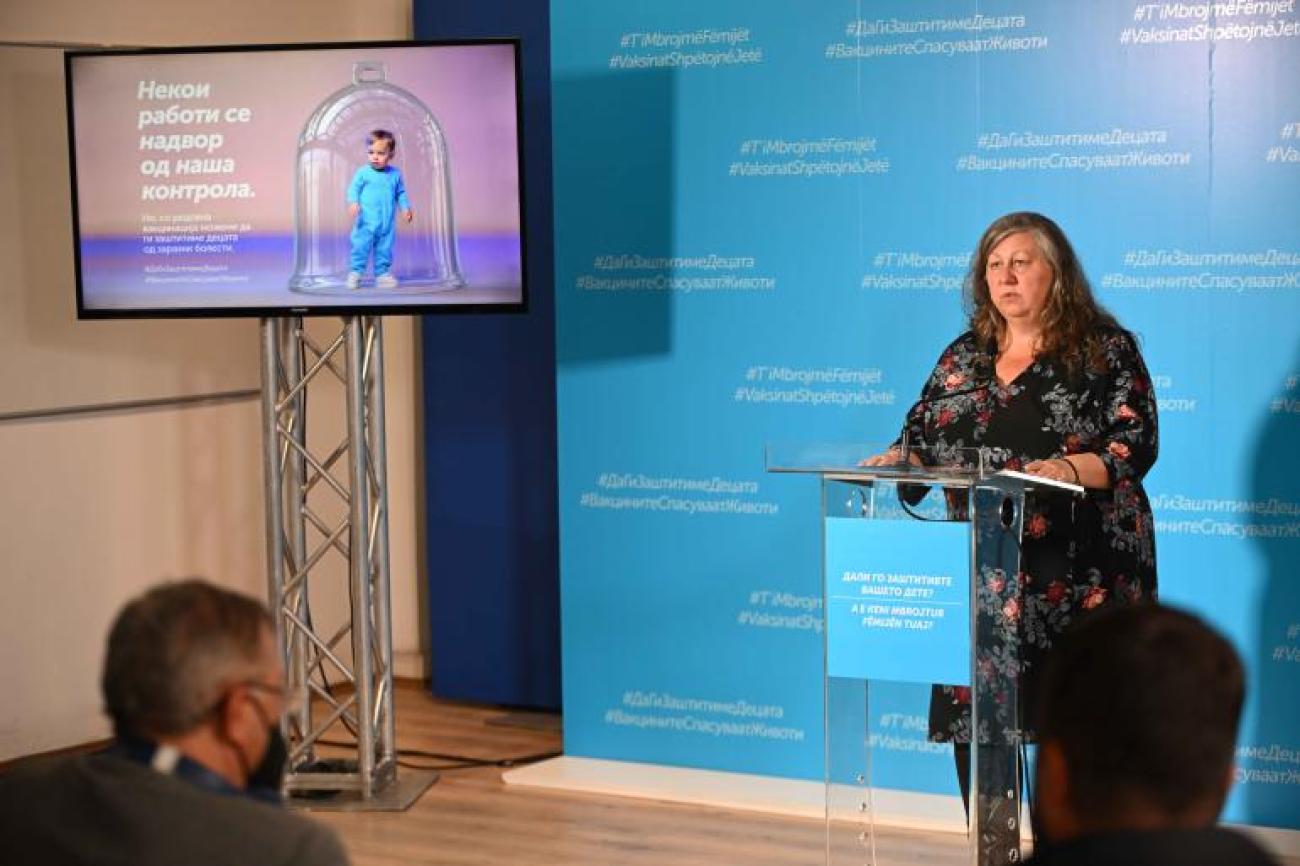Ministry of Health, UNICEF and WHO appeal for action to avoid possible measles outbreak

Data presentation on routine childhood immunization rates
Skopje, 21 April 2022 –The Minister of Health, Bekim Sali, at today's joint press conference with the UNICEF representative, Patrizia DiGiovanni and the WHO expert on immunization, Goran Kocinski, presented the latest data on routine childhood immunization rates, emphasizing that timely protection is crucial, especially for infants and preschoolers. He informed that although in the past period the health system was facing numerous challenges due to the COVID-19 pandemic and some vaccination points perform COVID-19 vaccination, routine vaccination takes place in parallel, as per the Immunization Calendar.
"Data shows that during 2020, the national coverage of the MMR vaccine was extremely low, 63% for the first dose and 68.5% for the second dose. Through efforts to strengthen vaccine uptake, the Ministry of Health and health institutions that are part of the immunization process, managed to increase the coverage in 2021 to 70.4% for MMR1, and 80.4% for the second dose. Unlike 2020, when multiple municipalities had coverage below 50%, in 2021 only Kumanovo reported coverage below 50%. In 2021, the highest coverage with the first dose of MMR is recorded in Prilep 98%, Kocani 95.5, as well as in other cities, said Bekim Sali, Minister of Health.
However, this coverage is far from the 95% required to achieve herd immunity and protect the community. The vaccine against measles, rubella and mumps vaccine has the lowest coverage, compared to all other vaccines. Measles is one of the most contagious respiratory diseases that can lead to severe, sometimes permanent complications such as pneumonia, brain swelling, hospitalization and death. They are especially dangerous for children under the age of five.
"While the most recent rates from 2021 are promising improvements compared to 2020, this is not good enough. Most alarming is the national uptake of measles, mumps, and rubella. These rates (2021 MMR1 – 70.4% and MMR2 - 80.4%) are lower than the rates in 2018 (MMR1 – 74.8% and MMR2 - 93.8%) when the country faced a measles epidemic that took the lives of 4 (four) children aged 5.5 to 13 months, all unvaccinated with the MMR vaccine. Low routine immunization rates raise concerns that a measles outbreak is possible, and we cannot wait for an outbreak to happen to respond,” said Patrizia DiGovanni, UNICEF Representative.
There has been an aversion to the MMR vaccines, rooted in aggressive misinformation that has been widely debunked. Also, while routine immunization services were available during the COVID-19 pandemic, there were some issues that contributed to reduced rates during 2020. For example, school closures resulted in delays in organizing systematic health checks and group immunization, resources required to rollout COVID-19 vaccines shifted.
“The COVID-19 pandemic is a stark reminder that infectious diseases cause suffering and death. Although the fight against the COVID-19 pandemic is not over yet, it is important to remember that any disruption to immunization services, even for a short period of time, carries an immediate risk to the community and especially to children from diseases that can be prevented with vaccines. When routine vaccinations are missed, the risk of epidemics increases," said Goran Kocinski, WHO technical expert on immunization.
Ahead of World Immunization Week, the Ministry of Health and UNICEF are launching a national campaign to remind citizens of the need to provide protection for their children from childhood infectious diseases.
"Our aim is to achieve the recommended coverage of 95 percent and in cooperation with the State Health Inspectorate and the health centers we are intensifying field work activities to reach children that have missed vaccination. As part of the campaign, we will also be sending unified SMS messages to parents who have missed vaccination for their children, and we will work on strengthening the regional network of coordinators from the immunization centers to intensify field work activities and actively monitor and detect children who have missed their vaccination and make sure they get vaccinated,” said Bekim Sali, Minister of Health.
He added that the Ministry of Health continuously provides vaccines from world-renowned manufacturers, which must meet strict quality criteria, i.e. they are registered by MALMED and they are provided with a quality certificate issued by the manufacturer and a certificate from a reference laboratory for quality control.
“Thanks to high vaccination rates in the past, parents today have been fortunate to grow up without seeing family or friends die or suffer life-long disability from diseases like measles or polio. Ironically, this is one of the reasons why some believe that vaccine preventable diseases are no longer a threat,” said Patrizia DiGovanni, UNICEF Representative. “We are appealing to parents and caregivers: Provide your children with the protection that your parents have provided you in the past. In the 21st century we should not consciously endanger the lives of children and put them at risk of diseases that are preventable with vaccines that are proven to be safe and highly effective.”

